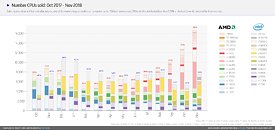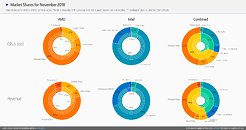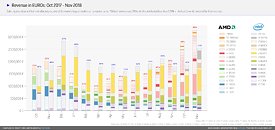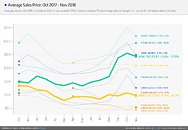Monday, December 3rd 2018

German Retailer Mindfactory.de Shows AMD Outselling Intel 2 to 1 in November
AMD seems to be picking up steam over Intel's previous sky-high dominance of the desktop CPU market (Intel still dominates aplenty, really; but AMD has been clawing back market percentage monthly). The latest figures from the German retailer show shoppers taking advantage of AMD's newfound competitiveness in the CPU space, with increasing sales momentum starting on June 2018 up to a staggering 69% total AMD units sold against Intel's 31% during the month of November.All in all, this equates to around 16,000 CPUs sold by AMD just last month - and represents an almost twofold increase in total number of AMD processors moved YoY by the retailer. Intel's ASP may be much higher than AMD's right now, which helps the company close the gap in earnings to a mere 12% difference, but the latter is likely betting on the greater perceived longevity of its AM4 platform to bring more consumers to their side of the field via a market penetration strategy. It's all about rebuilding the competitiveness image at this time - while racking in a steady profit from AMD's smart choices in processor design. A national European market does not a global one make, of course - and while it may be a little over the edge to extrapolate this to the entire market, one thing is for sure: AMD is gaining market share.
Sources:
Reddit, via ETeknix




42 Comments on German Retailer Mindfactory.de Shows AMD Outselling Intel 2 to 1 in November
Mindfactory is likely not representative of the global market, but it does seem to show us that either Intel is focusing heavily on the US market with the limited number of chips they have, or non-Americans are far more likely to buy AMD, and are currently doing so in large quantities.
Intel is in damage control, for good reason, and we know this because of its strategic hiring of some high profile people.Based on my understanding, AMD is still negatively looked upon in North America. Building a PC for a client, for example, they needed some strong convincing that the Ryzen CPUs are simply brilliant, cost effective and multi-core performing monsters. Yet he still seems skeptical and thought a Core i5 would have been the better choice. The term AMD Bulldozer seems to continually linger in the minds of people, even with the Ryzen launch lolIn that respect, fair competition is crucial to the survival of both AMD & Intel. It's about time Intel takes a nice beating in the CPU industry, as with how AMD has taken beatings throughout the years. Intel's future answer to the ZEN design is hiring Jim Keller (Legendary CPU Architect), lol. Well, its a good thing, ZEN is expandable for years to come.
Mindfactory = Europe
I'm from Europe and I never heard of mindfactory until someone starting making waves on TPU about them and Ryzen sales. That's how good a reference they are. In fact, a quick search for retailers in Europe doesn't even mention them.
How about Caseking, Alternate, Hardwareversand(doesn't exist anymore), Newegg or bytes at work?
geizhals.eu or pcpartpicker are also a good source to find some good Stores
In all seriousness, this isn't a big surprise. Ryzen absolutely kicks Intel Butt in Price/performance and even overall performance if you consider 2990WX has no competition in pure multi-core workload.
And with the prices of Intel CPUs here, you'd literally have to be brain dead to buy Intel right now (there are a lot of braindead people apparently).
I can even pick apart the argument you want to make before you've made it. You're essentially sat here stating that a more all-encompassing source of information is required. That would be a reasonable statement if it didn't completely ignore that the sources you're suggesting you would accept information from, don't release that sort of information and likely never will.
It's a transparent attempt to raise the standard of evidence beyond where we can reasonably expect there to be evidence. Once that is achieved in your eyes, you will then begin to attack the conclusions that can be drawn from mindfactory's data, asserting that Amazon or Newegg's data would show a different trend.
You'll then, ironically, begin to dredge up much lower standards of evidence in order to support this claim, relying on the vagueness of incomplete data like best-sellers lists on Amazon in order to make claims that are not falsifiable. When people point out that YOUR data is incomplete and doesn't meet the standard of evidence you yourself have demanded, you will simply make a circular argument back to why mindfactory's data also doesn't satisfy that standard of evidence, and you will continue this oscillation between unfalsifiable claims base on poor evidence, and attacking mindfactory's information until everyone gets too bored with you to bother continuing.
To being this somewhat back on topic, @GlacierNine , I was the one who brought up Amazon bestseller lists. Why? 'Cause more data points = better. They don't give as much detail, but they give an indication of relative sales numbers for the world's biggest etailer, and for (at least) three different countries/regions. It's great that MindFactory gives out sales data like this, and I applaud them for that (even if it's clearly also a "hey, look how transparent we are" PR move), but they're still a minor actor operating in one or a few countries (even if Germany is quite large). On the other hand, as a specialist store they're likely to attract a more informed customer base than Amazon. What would be interesting is looking at sales of various SKUs at MF to check how they align (or don't) with Amazon's rankings, especially in Germany, but really anywhere. How do they match, how do they differ, and what might we be able to extrapolate from this?
I also find it interesting that the data clearly shows that the increase in market share is due to a sales uptick for AMD and not just a drop for Intel; Intel is selling as many chips as they did in July, while AMD has doubled their sales since then. Of course, Intel is also coming back from a major slump in the last two months, either due to shortages, price increases, or both, so without this they'd likely have sold more than they did, and would likely have taken a portion of AMD's sales. Still, this doesn't take away from the fact that AMD is clearly in a very strong position in the CPU market right now. I'd call that a win for everyone who owns, uses or plans to buy a PC.
The problem with a non-representative sample isn't that it denies what you need to be the truth, is that is doesn't tell you anything about it. In this case, you have read the news, but you still have no idea whether AMD's growth is half of what's shown or it is 2-3 times bigger.
The fact you brought them up simply saves him the bother of justifying why we're discussing them instead of the actual data we do have, however limited that data is. We could have a much more reasonable discussion about the data we actually have, couching it in the usual terms of "if this is reflected elsewhere" or "of course this only reflects the euro market". Instead bug chooses to attack the existence of any data not serving his purposes, with inflammatory statements about how anyone that "understands statistics" wouldn't even bother reading it, and demands for a standard of evidence to be provided that he knows cannot be provided short of Jeff Bezos going insane.